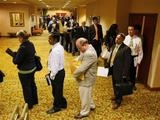Jobless Rate Could Lessen As States Exhaust Extended Benefit Program
Post Views 0
This is expected to further push down the US jobless rate. Economists Dean Maki at Barclays and Michael Feroli at JPMorgan Chase & Co, believes that beneficiaries of the program, now that they have been deprived of the financial blanket that was being provided, may decide to accept jobs that they otherwise would not have, whereas, others may quit looking for work and drop out of the labor force altogether. Since those, who are not looking for work are not counted in the unemployment rate, the unemployment rate may come down by 0.1 percent to 0.2 percent over the next couple of months.
Economist Maki went on to say, “The unemployment rate would be the place where the effect is likely to show up most. It may put some modest downward pressure” on the jobless rate.
Losing this income, may also force the people to rein in their spending, which will again have an effect on the economy. Those who are still looking for a job, but unable to find one, will add to the number of unemployed, hence, Maki feels that the drop will be nearer to 0.1 percent.
For a state to qualify for the government funded program, its ‘unemployment over any three- month period must average at least 10 percent more than the same period in any of the previous three years.’ Those states that did not meet these criteria were not eligible for the funding. Other states, which were initially eligible, became ineligible when their unemployment rates came down.
As of May, California, Florida, Illinois and Texas were disqualified and New York and New Jersey are predicted to lose their eligibility over the next two months.
Americans opting out of the labor market helped to reduce the unemployment rate by 0.1 percent, bringing it to its three-year lowest level at 8.1 percent in April. It has dropped by 0.9 percent over 12 months.
Feroli, chief U.S. economist at JPMorgan in New York, said the jobless rate, could see a significantly high impact, only if two ‘extreme scenarios’ took place. Either all those who were deprived of the benefits, in April and May, took on any job that came their way, or all of them opted out of the labor force. “Then we’re talking about a 0.2 point reduction in the unemployment rate,” he said. “It is not nothing.”
When the government next discusses on effective policing, the drop in the number of benefits recipients, is likely to be part of the agenda. Federal Reserve Bank of Richmond President Jeffrey Lacker, that the extended benefits have kept unemployment higher than it would have been. He has also predicted that the government will need to hike interest rates before 2014 ends.
He said, “As beneficial as such insurance programs can be, they also can affect the incentives to look for work or accept employment offers. Thus, they may actually increase the unemployment rate and the duration of unemployment.”
However, Chairman Ben S. Bernanke does not agree with these views and says that the low trend in the jobless rate could be reversed when, those who have left the labor force, encouraged by a buoyant economy, resume their search for a job.
Andrew Tilton, a senior economist at Goldman Sachs, said that the non-availability of extended benefit funds in April and May will push the jobless rate by less than 0.1 percent. He said, “There has been an improvement in the availability of jobs. In a better labor market, people losing their benefits would be more likely to look and to find a job, and less likely to simply drop out.”
Jesse Rothstein, a former chief economist for the Labor Department, however, does not share the enthusiasm. He feels that the job market is fairly static this year and “The constraint right now is there aren’t enough jobs.” “The biggest effect is a lot of people will just have less money,” he concluded.
President Barack Obama will be hoping that there is a substantial drop in the unemployment rate, as that would improve his re-election chances later this year.
Jobless Rate Could Lessen As States Exhaust Extended Benefit Program by Harrison Barnes


 10 Jobs with the Fastest Growing Salary in 2017
10 Jobs with the Fastest Growing Salary in 2017  Top 10 Universities to Produce Hedge Fund Workers
Top 10 Universities to Produce Hedge Fund Workers  San Diego County Back to Full Employment
San Diego County Back to Full Employment  Best and Worst States for Teachers to Teach
Best and Worst States for Teachers to Teach  Job Growth Expected in West Michigan Through 2015
Job Growth Expected in West Michigan Through 2015  Top Five Reasons Talented Employees Quit
Top Five Reasons Talented Employees Quit